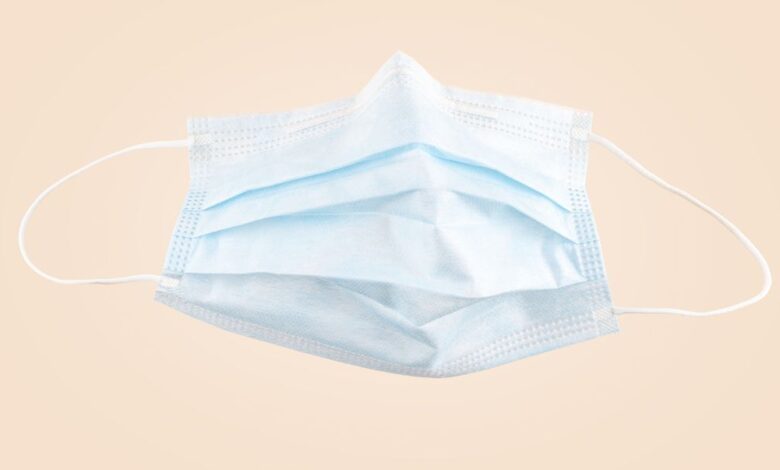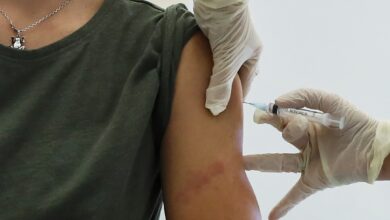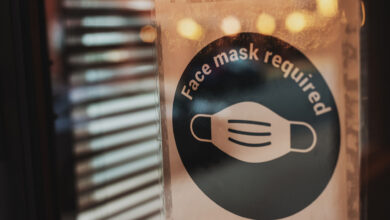Is It Safe to Not Wear Masks Anymore? Infectious Disease Experts Explain Risk for Vaccinated People

[ad_1]
- New federal health guidelines allow vaccinated individuals to skip masks in most public outdoor and indoor spaces, but some experts believe doing so may lead to increased COVID-19 spread.
- Vaccinated individuals may unknowingly become infected with SARS-CoV-2 and easily pass the virus onto unvaccinated family, friends and members of the public.
- Wearing a mask and continuing other safety protocols could help you avoid long-haul symptoms that vaccines may not prevent outright.
After a year plus of stringent regulations around face masks in public, many Americans were surprised to hear that officials at the Centers for Disease Control and Prevention rolled back a majority of their public mask mandates earlier this month. The decision to allow fully vaccinated individuals to remove face masks in most public spaces, both within indoor and outdoor settings, comes as the vaccination rate is approaching 38% — just about 125 million people across the country — and as officials also grapple with a dip in vaccination rates. To be clear, those who are unvaccinated must remain in face masks in crowded outdoor spaces and in all indoor settings, as the high risk for COVID-19 transmission hasn’t changed. It’s also why some experts are exercising caution despite these updated CDC guidelines.
The key distinction that has left many Americans confused and unsure about these guidelines is that it’s based, loosely, on the honor system. Between cities and states, there are few ways to verify a person’s vaccination status, plus businesses have varying policies on whether employees and guests need to mask up. To make matters more confusing, some states and cities may have local ordinances that require masks in all public spaces. Despite announcing a reversal on mandatory masks for vaccinated individuals in its stores, retailers like Walmart may ask guests in certain states to mask up regardless.
Others are more uneasy about the CDC’s new updated guidelines at a time where a majority of Americans have yet to receive a shot, all while current data suggests that (however small!) there is a risk for infection among those who received a vaccine. The vaccines in use now were approved in an emergency capacity by the Food and Drug Administration for their ability to prevent severe COVID-19 infection and symptoms — vaccines haven’t been studied as thoroughly for their ability to slow disease spread to others.
“Since their approval, vaccines have shown that they decrease the risk of asymptomatic COVID-19 infection substantially, but no vaccine is 100% effective,” says Sherrill Brown, M.D., the medical director of infection prevention at California-based AltaMed Health Services. “There’s still a small chance that even after we are vaccinated, we can become infected and show little to no signs of disease, and then go on to pass SARS-CoV-2 to others that are under-or unvaccinated.”
Should we still wear a face mask?
While the risk of doing so is low, as officers at the CDC continue to publish many studies supporting the effectiveness of vaccines against asymptomatic illness, there is a chance that vaccinated individuals may contract COVID-19 without knowing it. LaTasha Seliby Perkins, M.D., a professor and family physician within Georgetown University’s MedStar Hospital system, explains that while you likely won’t feel sick or any serious symptoms, you can just as easily pass it onto family, friends or the public around you, especially if they’re unvaccinated. Continuing to wear a face mask in these spaces may help protect others around you.
Vaccinated individuals have earned immunity against SARS-CoV-2, but there’s also concern that new virulent strains may impact immunity. “As the virus continues to affect communities, it also continues to mutate,” Dr. Perkins explains, “and while we have a level of immunity, it’s still important to be mindful once you get the vaccine.”
This content is imported from Instagram. You may be able to find the same content in another format, or you may be able to find more information, at their web site.
With a warm summer season on the horizon, CDC officials have been highlighting evidence that shows that the risk of COVID-19 transmission outdoors is low. But spending extended periods of time indoors, especially in crowded spaces, is entirely different; it can pose minimal risk to vaccinated individuals but serious, elevated risk to unvaccinated people.
“When in interior spaces, airflow can be much more stagnant or recycled, and large concentrations of SARS-CoV-2 can remain in the air for longer periods of time, easily entering the airways of unmasked individuals,” Dr. Brown adds. “Since no vaccine is 100% effective at preventing infection, this larger concentration of virus in the air makes it more likely that even some vaccinated individuals could become infected.”
To be clear, the CDC’s updated guidelines for vaccinated individuals do not apply to some interior spaces, especially in transit. Vaccinated individuals must wear masks on planes, trains, buses and shared transportation — and in crowded public places where essential services are offered, including hospitals.
Unvaccinated or under-vaccinated Americans can only skip a mask when they’re hanging out in a small group in a non-crowded outdoor space, or exercising alone. Guidelines still maintain that these individuals must wear masks in all indoor settings outside of the home.
Should we still be social distancing?
Like masks, keeping hand hygiene in check and, more importantly, maintaining as much social distance as possible are essential in lowering the risk of COVID-19 transmission — even for vaccinated individuals. If it’s at all possible, you should remain socially distant when meeting with friends, especially indoors. “Outdoors is always safer than indoors, distance will always be safer than being close, mask-wearing will always be safer than not wearing a mask,” Dr. Brown says.
Being socially distant outdoors in an uncrowded space could be a compromise for those who wish to skip masks altogether. “Outdoors, the protection of mask-wearing is negligible, especially when physical distancing is in play,” she adds.
Inside, socially distancing is paramount as limited ventilation increases the risk that infectious aerosols and droplets end up in your airways. Talking, shouting, itching a nose or sneezing, clearing throats; all of these activities push airborne aerosols to spread indoors, Dr. Perkins explains. “Indoors, there’s a concern for how air is being recycled; every building is different, and there’s no way to standardize airflow,” she says. “That’s why we still have to take extra precautions indoors, because the route of spread is airborne.”
I’m vaccinated and following guidelines. Why should I have to care about risk?
It’s understandable if you may be feeling mask fatigue: After all, it’s been more than a year, and you’ve hopefully had a chance to get vaccinated by now. Taking the time to still adhere to best safety practices against COVID-19 — wearing a mask, maintaining as much social distance as possible and keeping hands and surfaces clean — can save you from potentially spreading the disease to others around you, including vulnerable unvaccinated individuals or children.
This content is imported from Instagram. You may be able to find the same content in another format, or you may be able to find more information, at their web site.
Dr. Brown cites recent evidence that suggests that mild COVID-19 infections may later prompt prolonged symptoms and side effects for 6 months or longer. “These symptoms can include fatigue, memory complaints and pulmonary complaints,” says Dr. Brown, adding that a slew of other issues have been tied to what’s now known as long-haul symptoms. “We don’t know for sure if people that have asymptomatic or mild infections after vaccination may still have these long-term side effects after infection.”
Avoiding infection at all costs is going to pay off for your holistic health in the future, and taking care to exercise caution in certain areas will also benefit your community in the end.
“Like getting a vaccine, wearing a mask is a choice and a selfless act, so we appreciate when you wear it for others, such as kids who can’t be vaccinated,” Dr. Perkins adds. “There are lots of situations where you don’t need to wear a mask, but it’s always good to stop and ask yourself of the benefits of doing so.”
As more information about the coronavirus pandemic develops, some of the information in this story may have changed since it was last updated. For the most up-to-date information on COVID-19, please visit online resources provided by the CDC, WHO, and your local public health department.
This content is created and maintained by a third party, and imported onto this page to help users provide their email addresses. You may be able to find more information about this and similar content at piano.io
[ad_2]
Source link



